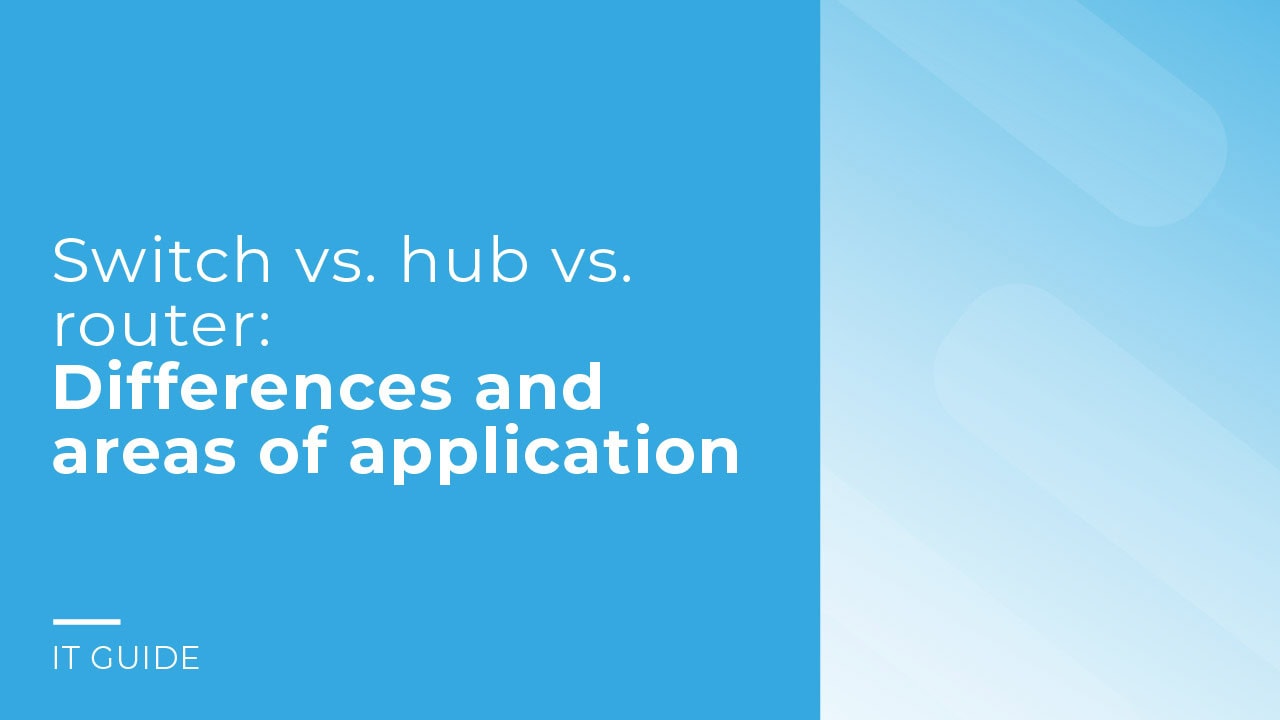
Both hubs and switches are hardware components for data transmission within a network. Although they share this main feature, they differ in many ways.
Read on to find out what this means for your network infrastructure and which device you should choose for the best possible connection.
In short: A hub sends data unfiltered to all connected devices, but can only transmit them one after the other. Switches, on the other hand, identify Mac addresses and only transmit data to specific recipients - several at the same time and in the shortest possible time.
A hub transmits all data to every participant connected to it in a LAN network. It works on layer 1 of the OSI model (physical layer).
However, its work is limited: Several connected devices and larger data volumes slow down performance. This affects all network participants - even those who do not actually need the information.
A hub is therefore unsuitable in a corporate environment due to both its low performance and the lack of data protection. However, this type of data transfer is also being used less and less in private, very small networks.
A network switch is an improved version of a hub. It also sends data to network participants, but distinguishes them based on their Mac address. In this way, information is only sent to the instance for which it is intended.
This is important from a data protection perspective, but also enables faster transmission without affecting non-participants at all. In addition, a switch can manage several data transmissions simultaneously.
Switches work on layer 2 of the OSI model (data link layer) and therefore have functions for error detection and correction and addressing ahead of a hub. There are also so-called layer 3 switches (the third layer of the OSI model is the network layer), which also perform basic routing functions.
While hubs always work in the same way, network switches can be further subdivided according to their functions and properties. Depending on the model selected, they are the ideal component for everything from small home networks to huge corporate networks.
You have the choice between:
You can read more about this in our blog post: "Which switch is the right one? - From home use to large corporations".
Once the switch vs. hub issue has been clarified, the router is often thrown into the ring. However, it differs in its basic function. It works on layer 3 of the OSI layer model and is therefore responsible for data transmission across connection sections, as well as different networks. It uses IP addresses for this purpose.
In contrast to switches and hubs, a router is therefore not limited to a LAN network.
An exception to this are the layer 3 switches already mentioned, which do use IP addresses and perform basic router functions.
However, this topic would go beyond the scope of this article and lead away from the initial question. Are you still interested in finding out exactly what the difference is and whether a 3-layer switch is the only component you need? Then please read our blog post on the topic: "Internet switch vs. router: differences and best use".
For a long time, hubs were the ultimate way to connect devices to a local network. However, switches have caught up in recent years and offer a lot of advantages that their predecessors can't match.
So if you are asking yourself whether a switch or a hub is the right choice for you, the answer is easy: the better solution is usually a network switch. This is true for small home networks, but especially for complex corporate networks. We offer a wide range of switches from various renowned brands, including Cisco, Brocade, HPE Aruba and Juniper.
Are you put off by the higher purchase costs? Refurbished network switches of all kinds are not only a sustainable alternative from an environmental point of view, but also from the point of view of your wallet. Take a look at our range and equip yourself with the best option for data transmission within your network.
Hubs, switches and routers differ primarily in their function. Their use therefore varies – the size and complexity of the company should determine which device is suitable.
A hub is used in very small and simple networks. If a low-cost solution is required for a small network – despite the outdated technology – a hub may be the right choice. However, hubs are rarely used today as they offer only limited performance and security.
For modern networks or data centres, switches should be used. They connect devices within a Local Area Network (LAN) and ensure better performance as well as targeted data transmission.
A router, on the other hand, connects different networks and enables connectivity between LANs. Data packets are forwarded between the networks using IP addresses, with the most efficient path selected. In this way, your LAN can be connected to the internet or to different office networks.
Switches and routers can be equipped with USB ports that provide various functions. For example, storage devices such as external hard drives or USB sticks can be connected to access stored data or share it across the network. Printers can also be connected via USB and made available to all devices in the network.
In addition, USB ports are often used for data backups, connecting 3G/4G modems to provide a mobile internet connection (e.g. for smartphones), or for charging devices. In the area of storage, drivers can also be used to expand capacity. However, all these functions are model-dependent – not every router or switch automatically comes with USB ports offering the features described.